高中英语 Unit 2《Working the landgrammar》教案 新人教版必修4
人教版高中英语必修4《Unit 2 Working the land》教案2篇
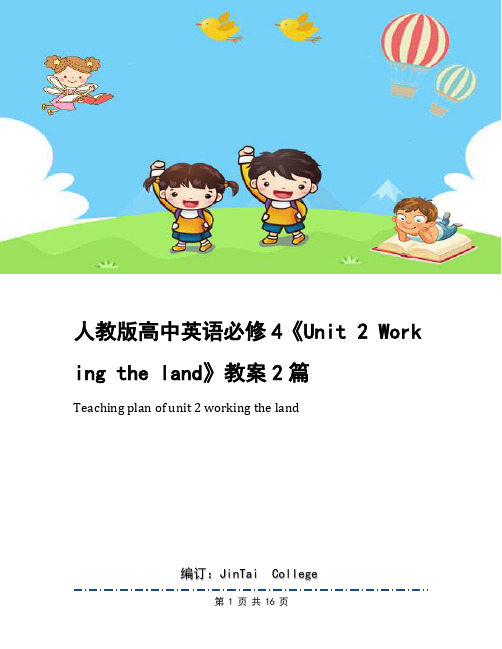
人教版高中英语必修4《Unit 2 Work ing the land》教案2篇Teaching plan of unit 2 working the land编订:JinTai College人教版高中英语必修4《Unit 2 Working the land》教案2篇前言:英语作为在许多国际组织或者会议上都是必需语言,几乎所有学校选择英语作为其主要或唯一的外语必修课。
英语教学涉及多种专业理论知识,包括语言学、第二语言习得、词汇学、句法学、文体学、语料库理论、认知心理学等内容。
本教案根据英语课程标准的要求和教学对象的特点,将教学诸要素有序安排,确定合适的教学方案的设想和计划、并以启迪发展学生智力为根本目的。
便于学习和使用,本文档下载后内容可按需编辑修改及打印。
本文简要目录如下:【下载该文档后使用Word打开,按住键盘Ctrl键且鼠标单击目录内容即可跳转到对应篇章】1、篇章1:人教版高中英语必修4《Unit 2 Working the land》教案2、篇章2:人教版高中英语必修4《Unit 2 Working the land》教案篇章1:人教版高中英语必修4《Unit 2 Working the land》教案教学准备教学目标(1)知识目标:让学生通过阅读课文更多地了解我国著名的农业科学家袁隆平的科研成果及其影响。
(2)能力目标:让学生进一步使用恰当地阅读方式与技能,如略读(skimming),快速阅读(fast reading),细读(close reading)等(3)情感目标:让学生不但学习袁隆平的科研精神,更要学习他不计较名利,踏踏实实的生活态度。
教学重难点1.阅读课文更多地了解我国著名的农业科学家袁隆平的科研成果及其影响。
教学过程1.话题的引导。
(Pre-reading)1).开头通过设计了一首熟悉的诗歌,让学生知道话题---farming.2).涉及到提高产量从而解决世界饥荒问题,从而引出本节课的中心话题--伟大人物袁隆平。
Unit 2《Working the land》教案1-Grammar and usage(人教版必修4)

教案(牛津版)Module 4Unit2 Grammar and usageTeaching Aims:1、Learn that modal verbs can be used to talk about ability, obligation, certaintyor permission, to make requests, suggestions, offers and to give advice.2、Enable students to learn that some modal verbs can be used with thecontinuous form and the perfect form to talk about current affairs or past actions.Teaching Important Points:1、Develop the students’ ability of using modal verbs.2、How to make students master the usage of modal verbs.Teaching Difficult Points:Develop the students’ ability of using modal verbs and how to make students master the usage of modal verbs.Teaching Methods:Explanation and exerciseTeaching Aids:1.The multimedia2.The blackboardTeaching Procedures:Step1 Warming upSay some sentences to warm up students: Can you drive ? He can jump 2 meters.You must work hard ,or you have to live a hard life.Step2 Lead inLet students say sentences including modal verbs as many as possible.Step3 Activities: (1)Introduce modal verbs with the following: Now, many of us can speak English quite well, but a few years ago, we couldn’t. If we talk about the ability someone has now , we use “can”. If we talk about the ability someone had in the past, we usually use “could”.Ask students: If we talk about the ability in the future, what modal verbs do we use ? ( will, shall, be able to )(2) Ask students to make sentences using these words to talk about ability.Show the usage of the modal verbs on the screen.(3) Talk about obligation of the modal verbs “should, ought to, have to, must ”,Show the usage of the modal verbs on the screen.Step4 Write the following sentence on the blackboard :I might/may/could/should/ought to/will/must watch the TV programme tonight.Explain the usage of these modal verbs, showing more examples on the screen. Step5 Explain the usage of permission of the modal verbs “Can, could, might”Show the examples on the screenStep6. Ask students to read Part 1 on page 28 to find out how modal verbs are used to talk about ability, obligation, certainty and permission, showing moreexamples to the students and explaining the usage to the students.Step7 Ask students to read Part 2 about the modal verbs of making requests, suggestions or offers, and give advice.Step8 Ask students to read the instructions for the exercise on page 29, complete the article individually, and then check the answers in class. Ask students to give reasons for each choice they make.Step 9 Ask students to read Part 4 on Page 28. Make sure that they understand why the continuous form or the perfect form is used in the example sentences. Homework: Part C1 on page 100 of the workbookReference for teaching情态动词语法特征:1)情态动词不能表示正在发生或已经发生的事情,只表示期待或估计某事的发生。
人教版高中英语必修4《Unit 2 Working the land》教案
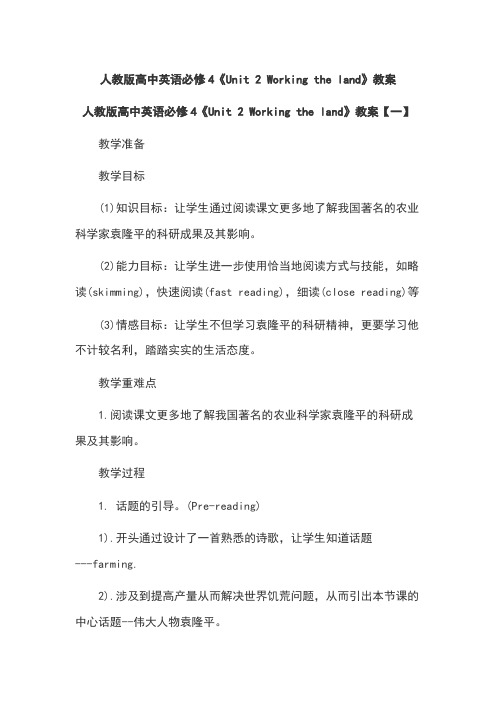
人教版高中英语必修4《Unit 2 Working the land》教案人教版高中英语必修4《Unit 2 Working the land》教案【一】教学准备教学目标(1)知识目标:让学生通过阅读课文更多地了解我国著名的农业科学家袁隆平的科研成果及其影响。
(2)能力目标:让学生进一步使用恰当地阅读方式与技能,如略读(skimming),快速阅读(fast reading),细读(close reading)等(3)情感目标:让学生不但学习袁隆平的科研精神,更要学习他不计较名利,踏踏实实的生活态度。
教学重难点1.阅读课文更多地了解我国著名的农业科学家袁隆平的科研成果及其影响。
教学过程1. 话题的引导。
(Pre-reading)1).开头通过设计了一首熟悉的诗歌,让学生知道话题---farming.2).涉及到提高产量从而解决世界饥荒问题,从而引出本节课的中心话题--伟大人物袁隆平。
2. 跟读与限时阅读完成导学案练习贯彻目的与困难策略,指导学生根据不同的阅读目的,在阅读的不同阶段,灵活使用各种阅读策略,捕捉文章主要信息,理解作者的写作意图,突破本文的教学重点与难点。
采用整体语言教学法和任务型语言教学法。
1)、通过限时阅读训练,引导学生如何利用略读(skimming)的方法把握文章的大意,侧重培养快速阅读理解能力和文章中心把握能力。
2)、精读各个段落语段,侧重培养快速捕捉文章重要细节的能力和猜测生词的能力,学会欣赏文章中的优美句子。
3:阅读过程--浅层次阅读。
(Reading I)1). 其中关于人物的基本信息中,通过设计了一个信息表格的浅层次阅读练习,对文中人物有了初步了解。
2). 关于他的梦想,书本上描写得非常生动,我让班里有艺术特长的学生画了一幅漫画,利用画面反映课文第四段所描述的内容,同时用第一人称配了声音效果。
4. 阅读过程--深层次阅读。
(Reading II)在处理了一些简单信息之后,阅读人物最重要的是要读出人物不同于其他人的成就以及值得学生学习的一些可贵品质。
高中英语必修4 Unit2 Working the land语法教案
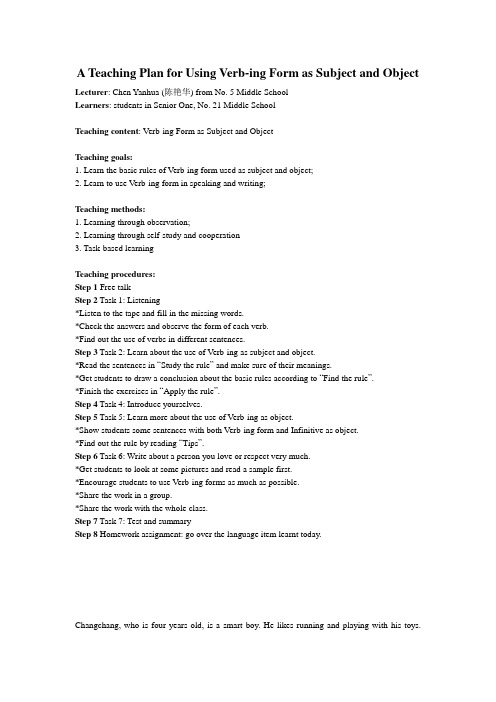
A Teaching Plan for Using Verb-ing Form as Subject and ObjectLecturer: Chen Yanhua (陈艳华) from No. 5 Middle SchoolLearners: students in Senior One, No. 21 Middle SchoolTeaching content: Verb-ing Form as Subject and ObjectTeaching goals:1. Learn the basic rules of Verb-ing form used as subject and object;2. Learn to use Verb-ing form in speaking and writing;Teaching methods:1. Learning through observation;2. Learning through self-study and cooperation3. Task-based learningTeaching procedures:Step 1 Free talkStep 2 Task 1: Listening*Listen to the tape and fill in the missing words.*Check the answers and observe the form of each verb.*Find out the use of verbs in different sentences.Step 3 Task 2: Learn about the use of Verb-ing as subject and object.*Read the sentences in “Study the rule” and make sure of their meanings.*Get students to draw a conclusion about the basic rules according to “Find the rule”.*Finish the exercises in “Apply the rule”.Step 4 Task 4: Introduce yourselves.Step 5 Task 5: Learn more about the use of Verb-ing as object.*Show students some sentences with both Verb-ing form and Infinitive as object.*Find out the rule by reading “Tips”.Step 6 Task 6: Write about a person you love or respect very much.*Get students to look at some pictures and read a sample first.*Encourage students to use Verb-ing forms as much as possible.*Share the work in a group.*Share the work with the whole class.Step 7 Task 7: Test and summaryStep 8 Homework assignment: go over the language item learnt today.Changchang, who is four years old, is a smart boy. He likes running and playing with his toys.Going to East Lake Park and playing model cars is his favourite. It seems playing is his job every day. He is also interested in listening to music. He enjoys talking to other people and it seems that he never stops talking until he goes to sleep. He is good at telling stories like “The big grey wolf”. He hates eating vegetables. He dreams of being a policeman, a driver, a doctor, a superman,….I am a teacher. Teaching English is my job every day. I enjoy working with my students together. It makes me full of energy all day. I am interested in seeing movies. Although I love my job, sometimes I feel tired of doing the same thing every day and dream of trying something new, like I hate cheating very much. Students’ cheating in the exam makes me angry and sad. Now I am enjoy myself by giving a class to students in No. 21 Middle School.I forgot buying the same book before.I forgot to tell her about it.B) I remember locking the door.Remember to lock the door.D) They went on talking.They went on to talk about other matters.E) He stopped smoking last week.He stopped to smoke.F) Talking to such a person means wasting your time.I don’t mean to hurt you.G) Try knocking at the back door if nobody hears you at the front door.Try to get some sleep.H) I can’t help laughing.I can’t help (to) clean the place.Love---John LennonLove is real; real is love. Love is ________; ________ love. Love is ________ to be loved.Love is touch; touch is love. Love is ________; ________ love. Love is ________ to be loved. Love is you, you and me. Love is ________ we can be.Love is free; free is love. Love is ________; ________ love. Love is ________ to be loved.。
高中英语《Unit 2 Working the land》优质课教案、教学设计

必修4 Unit2 Working the land 教学设计I.New words for the text.1.chemical(adj.)anic(adj.)认真观察,各小组积极发言3. fertile(adj.)4. production(n.)5. bacteria(n.)6. pest(n.)7. nutrition(n.)8. mineral(n.)9. discovery (n.)快速限时默10. focus(vt. &n.)读4’,11. soil(n.)理解文章分12. reduce (vt.)段及大意13. root (n.)14. skim (vt.)15. underline (vt.)16. summary(n.)17. comment (n.)II.Phrases for the text.1.build up2.lead to3.refer to…4.make the soil fertile5.natural waste from animals6.focus on 快速阅读,7.put…in the field 从课文中找8.make the soil rich 出关键词,II. Try your best to correct the passage below.Over the past half century, using chemical fertilizers become very common in farming. Many farmers welcomed themselves as a great way to stop crop disease and increased production. Recently, however, scientists have been found that long- term use of these fertilizers can cause damage to the land and, even more dangerous, to people’s healthy. With these discoveries, some farmers are beginning to turn to organic farming, that is simply farming with using any chemicals. There is many different organic farming methods. All of them have the same of goal: to grow good food and avoid damage the environment or people’s health.HomeworkFree talk about chemical and organic farmingThe disadvantages of chemical farmingThe advantages of organic farmingThe measures should be taken to avoid damaging the environment or people’s health。
人教课标版高一英语必修4Unit 2 Working the land 语法课优质教案

Unit 2 Working the land语法课一、教学内容 Discovering useful structures (p.13); Using structures (p. 50)二、教学目标1. 学生能够识别动词-ing 形式在句子中作主语或宾语,并能够使用这种结构。
2. 学生能够区分某些常用动词后面跟不定式作宾语还是动词-ing 形式作宾语。
三、教学步骤步骤一 热身给学生呈现几幅有趣的公示牌,提醒学生注意其中使用的-ing 形式。
设计意图:从日常生活中的现象入手,一方面激起学生学习语言知识的兴趣,另一方面告诉学生这种语言知识在实际生活中的应用。
步骤二 发现与探究1. 让学生在课文里划出带有动词-ing 形式的句子。
可以先呈现给学生一个例子。
2. 小组活动。
让学生从这些句子中,找出动词-ing 形式短语作主语和宾语的句子,分成两大类。
设计意图:培养学生的探究和归纳能力。
步骤三 动词-ing 形式作主语I. Warming UpHave you ever seen these signs?Parking, spitting, littering, smoking-ing formsII. Discovering1.Find and underline the sentences in thepassage that use –ing forms.Example:Since then, finding ways to grow more rice has been his life goal. (paragraph 2)Discovering2. Choose the sentences that use –ing forms either as the subject or the object.As the subject Since then, finding ways to grow more rice has been his life goal.As the object1. 先让学生集中精力观察动词-ing 形式短语作主语的句子,看看能否发现动词-ing 形式的特点。
高中英语Unit2Workingtheland-grammar教案(新人教版必修4)
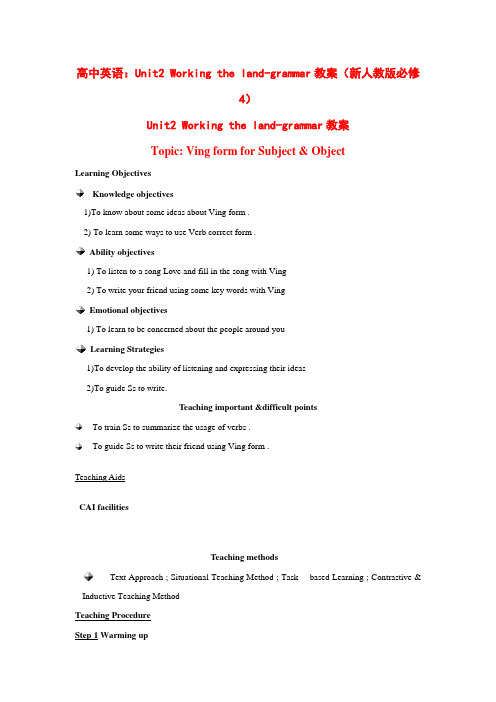
高中英语:Unit2 Working the land-grammar教案(新人教版必修4)Unit2 Working the land-grammar教案Topic: Ving form for Subject & ObjectLearning ObjectivesKnowledge objectives1)To know about some ideas about Ving form .2) To learn some ways to use Verb correct form .Ability objectives1) To listen to a song Love and fill in the song with Ving2) To write your friend using some key words with VingEmotional objectives1) To learn to be concerned about the people around youLearning Strategies1)To develop the ability of listening and expressing their ideas2)To guide Ss to write.Teaching important &difficult pointsTo train Ss to summarize the usage of verbs .To guide Ss to write their friend using Ving form .Teaching AidsCAI facilitiesTeaching methodsText Approach ; Situational Teaching Method ; Task ---based Learning ; Contrastive & Inductive Teaching MethodTeaching ProcedureStep 1 Warming up1)T. gets Ss to discuss some signs .2)To give a definition about Ving form .Step 2 Presentation1)Ss. Find and underline the sentences in the passage that use Ving forms as either thesubject or the object.2) To help Ss draw a conclusion about Ving form .Step3 Practice1) Rewite the sentences using Ving form .2) Complete the sentences using verb correct form .3) Listen to a song and fill in the blanks using Ving form .Step 4 Consolidation1) Talk about the pictures using the key words .2) Talk about our friend using Ving form as much as possible .3) Write about the person you love or respect following an example .Step 5 Homework.1. Summary and remember :*Which verbs should be followed by verb-ing form as object?*Which verbs should be followed by “to do ”?*Which verbs can be followed by both forms?2. Finish your writing if you don’t finish .。
Unit2Workingtheland教案(新人教必修4).doc
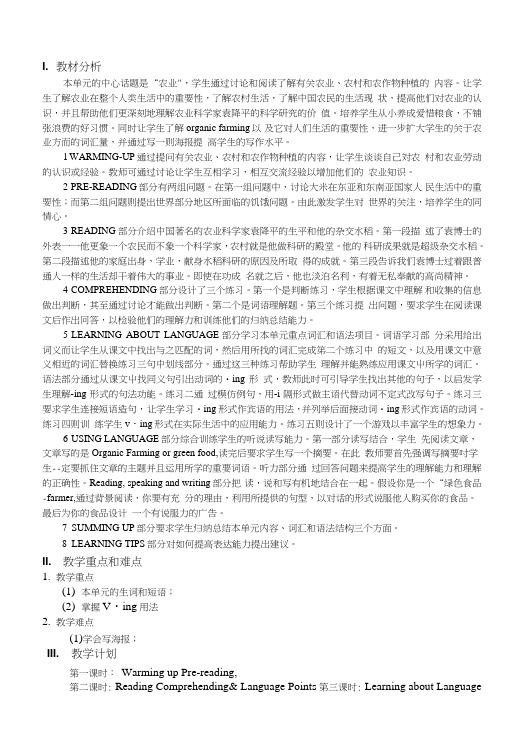
I. 教材分析本单元的中心话题是“农业",学生通过讨论和阅读了解有关农业、农村和农作物种植的内容。
让学生了解农业在整个人类生活中的重要性,了解农村生活,了解中国农民的生活现状,提高他们对农业的认识,并且帮助他们更深刻地理解农业科学家袁降平的科学研究的价值。
培养学生从小养成爱惜粮食,不铺张浪费的好习惯。
同时让学生了解organic farming以及它对人们生活的重要性,进一步扩大学生的关于农业方而的词汇量,并通过写一则海报提高学生的写作水平。
1WARMING-UP通过提问有关农业、农村和农作物种植的内容,让学生谈谈自己対农村和农业劳动的认识或经验。
教师可通过讨论让学生互相学习,相互交流经验以增加他们的农业知识。
2PRE-READING部分有两组问题。
在第一组问题中,讨论大米在东亚和东南亚国家人民生活中的重要性;而第二组问题则提出世界部分地区所面临的饥饿问题。
由此激发学生对世界的关注,培养学生的同情心。
3READING部分介绍中国著名的农业科学家袁降平的生平和他的杂交水稻。
第一段描述了袁博士的外表一一他更象一个农民而不象一个科学家,农村就是他做科研的殿堂。
他的科研成果就是超级杂交水稻。
第二段描述他的家庭出身,学业,献身水稻科研的原因及所取得的成就。
第三段告诉我们袁博士过着跟普通人一样的生活却干着伟大的事业。
即使在功成名就之后,他也淡泊名利,有着无私奉献的高尚精神。
4COMPREHENDING部分设计了三个练习。
第一个是判断练习,学生根据课文中理解和收集的信息做出判断,其至通过讨论才能做出判断。
第二个是词语理解题。
第三个练习提出问题,要求学生在阅读课文后作出冋答,以检验他们的理解力和训练他们的归纳总结能力。
5LEARNING ABOUT LANGUAGE部分学习本单元重点词汇和语法项目。
词语学习部分采用给出词义而让学生从课文中找出与之匹配的词,然后用所找的词汇完成笫二个练习中的短文,以及用课文中意义相近的词汇替换练习三句中划线部分。
重庆高中英语必修四 Unit2《Working the land》全套教案
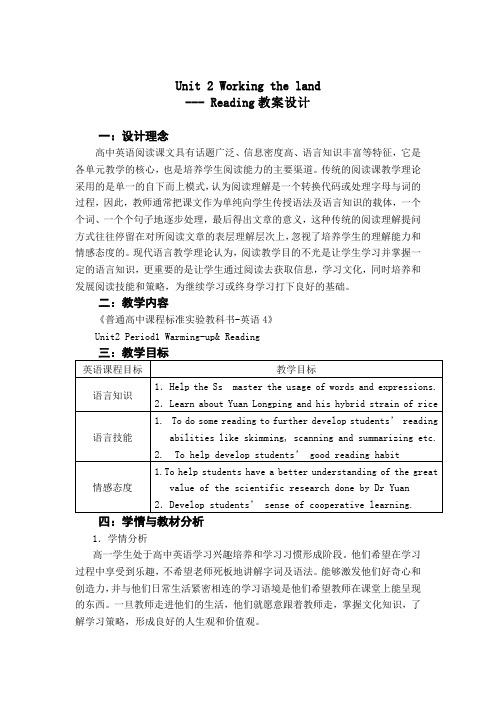
Unit 2 Working the land--- Reading教案设计一:设计理念高中英语阅读课文具有话题广泛、信息密度高、语言知识丰富等特征,它是各单元教学的核心,也是培养学生阅读能力的主要渠道。
传统的阅读课教学理论采用的是单一的自下而上模式,认为阅读理解是一个转换代码或处理字母与词的过程,因此,教师通常把课文作为单纯向学生传授语法及语言知识的载体,一个个词、一个个句子地逐步处理,最后得出文章的意义,这种传统的阅读理解提问方式往往停留在对所阅读文章的表层理解层次上,忽视了培养学生的理解能力和情感态度的。
现代语言教学理论认为,阅读教学目的不光是让学生学习并掌握一定的语言知识,更重要的是让学生通过阅读去获取信息,学习文化,同时培养和发展阅读技能和策略,为继续学习或终身学习打下良好的基础。
二:教学内容《普通高中课程标准实验教科书-英语4》Unit2 Period1 Warming-up& Reading四:学情与教材分析1.学情分析高一学生处于高中英语学习兴趣培养和学习习惯形成阶段。
他们希望在学习过程中享受到乐趣,不希望老师死板地讲解字词及语法。
能够激发他们好奇心和创造力,并与他们日常生活紧密相连的学习语境是他们希望教师在课堂上能呈现的东西。
一旦教师走进他们的生活,他们就愿意跟着教师走,掌握文化知识,了解学习策略,形成良好的人生观和价值观。
2.教材分析本单元的中心话题是“农业”学生通过讨论和阅读了解有关农业个农作物的种植的内容,了解了农业对人类生活的重要性。
阅读教学取材“水稻之父”---袁隆平,话题有趣,材料真实,学生们头脑中已经储存了大量的信息和对人物的全面、深度的认识,教学内容能引起学生很大的探究和讨论的兴趣。
3.教学重点、难点:Teaching Important PointsHelp the students to understand the passage better.Learn and master the important words and phrases in this period.How to help the students make up their minds to make contributions to the society in the future like Dr Yuan.Teaching Difficult PointsHow to help the students improve their reading ability and understand the passage better.How to master the important language points in this passage.五:教学准备1. a computer2. a blackboard六:教学过程Step1:Warming-upTask 1: Leading inAsk Ss some questions.T: Have you ever been to the countryside?S: Yes.T: Do you want to go to the farm?S: Yes.T: You are very nice! Now ,let us go to the farm together .How many students have a QQ farm? Please put up your hands. Can you play now?S: Yes, it’s ver y easy!First,we need go to the shop to buy some seeds. Second, we should plough and turn over the soil so that we can have a good harvest .We should remove the weeds, fertilize and water the crops…设计说明:教师先以直观图片和游戏的形式创设话题情景,激活学生头脑中的相关图式,通过师生互动,巧妙地将学生的思维引导到课文主题上来,借助层层递进的话题引导,使学生逐渐进入更深层得学习境界。
人教版必修四unit2《working the land-grammar》优秀教案(重点资料).doc

Unit2 Working the land-grammar教案Topic: Ving form for Subject & ObjectLearning ObjectivesKnowledge objectives1)To know about some ideas about Ving form .2) To learn some ways to use Verb correct form .Ability objectives1) To listen to a song Love and fill in the song with Ving2) To write your friend using some key words with VingEmotional objectives1) To learn to be concerned about the people around youLearning Strategies1)To develop the ability of listening and expressing their ideas2)To guide Ss to write.Teaching important &difficult pointsTo train Ss to summarize the usage of verbs .To guide Ss to write their friend using Ving form .Teaching AidsCAI facilitiesTeaching methodsText Approach ; Situational Teaching Method ; Task ---basedLearning ; Contrastive & Inductive Teaching MethodTeaching ProcedureStep 1 Warming up1)T. gets Ss to discuss some signs .2)To give a definition about Ving form .Step 2 Presentation1)Ss. Find and underline the sentences in the passage that useVing forms as either the subject or the object.2) To help Ss draw a conclusion about Ving form .Step3 Practice1) Rewite the sentences using Ving form .2) Complete the sentences using verb correct form .3) Listen to a song and fill in the blanks using Ving form . Step 4 Consolidation1) Talk about the pictures using the key words .2) Talk about our friend using Ving form as much as possible .3) Write about the person you love or respect following an example .Step 5 Homework.1. Summary and remember :*Which verbs should be followed by verb-ing form as object? *Which verbs should be followed by “to do ”?*Which verbs can be followed by both forms?2. Finish your writing if you don’t finish .*************************************。
高中英语Unit 2 Working the land-The Second Period Words and Grammar教案 新课标 人教版 必修4
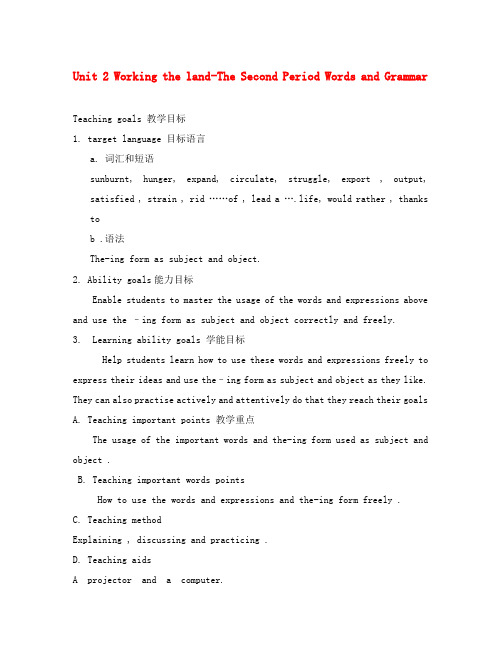
Unit 2 Working the land-The Second Period Words and GrammarTeaching goals 教学目标1.target language 目标语言a.词汇和短语sunburnt, hunger, expand, circulate, struggle, export , output, satisfied , strain , rid ……of , lead a ….life, would rather , thanks tob .语法The-ing form as subject and object.2.Ability goals能力目标Enable students to master the usage of the words and expressions above and use the –ing form as subject and object correctly and freely.3. Learning ability goals 学能目标Help students learn how to use these words and expressions freely to express their ideas and use the–ing form as subject and object as they like. They can also practise actively and attentively do that they reach their goals A. Teaching important points 教学重点The usage of the important words and the-ing form used as subject and object .B.Teaching important words pointsHow to use the words and expressions and the-ing form freely .C. Teaching methodExplaining , discussing and practicing .D. Teaching aidsA projector and a computer.E. Teaching procedures & waysStep 1 Greeting and revisionFree talk:1. What’s your breakfast ?2. When you are eating at the dinning-room, do you often find some food thrown away ?Step II word studyA. Complete the exercise on the screen. Teaches shows the following in the screenComplete the sentences with the words from the box in proper forms. Some Words may not be used.Sunburnt, strain, output , export , rid …of , would rather , increase , satisfied , super ,lead…a life , thanks to , struggle1.With the development of science and technology china is ____ many kindsof electric products to developing countries.2.Yao Ming plays basketball in NBA and he is a ____ basketball star.3._____ bad weather ,our football match has to be put off.4.Now the old couple _____ simple but happy _____ in the countryside .5.Judging from his ___ _face and arms , he works in the open air .6.I’m very tired . I _____ have a good sleep than go to the cinema .7.The ____ of corn this year is double that of last year .8.We ____ wheat to Russia and import silk from Japan .9.The basketball league _____ by adding four new terns .10.The people _____ to get out of the burning building .A few minutes later , the teacher may ask some students to read out theiranswers and give the Chinese meaning of each sentence . The teacher corrects any mistake and gives some explanations.Answers to the sentences:1.exporting2.super3.thank to4. is leading a …life5.sunburnt6.would rather7.output8.export9. was strained 10.struggledB.Finish the Exx 1,2 and 3 on page 11.Step III grammarThere are two tasks in this step. One is to do some explanations about the structure ; the other is to do some exercises in the discovering useful structures in page 12.Task 1A. The following sentences are from the text. There are some useful structures in them . Let students translate them and pay attention to these boldface words .plete the sentences with the given words in proper forms.Check the answers and correct mistakes if there is any and do some explanations at the same time .Task 2A .Do some exercises: Please do ex 2 on page 12. You are asked to rewrite the following sentences using the -ing form as the subject .Ask some students to do them one by one .B. Do Exercise 3. This time join the two halves to sentences.C. Finish EX4 in page 13. Use the following phrases with the –ing form to describe a person you admire.Teacher can give students four minutes to write a short passage by themselves and then ask one or two students to give their answers.Step IV Using StructuresA.Finish Exercise 1 on Page 50. Check their answers with the wholeclass .B. Exercise Now work in pairs or groups to finish this task.Step V HomeworkFinish all Exercises on Page 49.。
Unit2WorkingthelandGrammarandposition教案-高中英语牛津译林版(

译林版(2020)选修第一册Unit 2 Working the landGrammar and position本节课的教材分析:本节课是译林版(2020)选修第一册Unit 2 Working the land Grammar and position的一节课。
教材主要包含了一个主题为“工作的土地”(Working the land)的阅读材料和相关的语法知识和写作任务。
教学目标:1. 语言知识目标:学生能够通过阅读文章,掌握关于农业和农民工作的相关词汇和表达方式,并复习和巩固被动语态的用法。
2. 语言技能目标:学生能够通过阅读文章,提取关键信息,了解农业的重要性以及农民的辛勤劳动,能够运用所学知识,写一篇关于农民工作的短文。
教学重点:1. 掌握关于农业和农民工作的相关词汇和表达方式。
2. 复习和巩固被动语态的用法。
3. 提取关键信息,了解农业的重要性以及农民的辛勤劳动。
4. 运用所学知识,写一篇关于农民工作的短文。
教学难点:1. 被动语态的用法和变换。
2. 如何通过阅读文章提取关键信息。
3. 如何运用所学知识,写一篇关于农民工作的短文。
学情分析:学生为高二年级的学生,英语水平相对较高,但对于语法知识和写作任务可能存在一定的困难。
学生对农业和农民工作可能有一定的了解,但对于具体的相关词汇和表达方式可能不太熟悉。
教学策略:1. 采用任务型教学策略,通过阅读文章和相关练习,引导学生主动探索和应用所学知识。
2. 采用情境化教学策略,引入真实的农民工作经历和相关故事,增加学生的兴趣和参与度。
教学方法:1. 阅读理解:让学生阅读文章,提取关键信息,回答问题,培养学生的阅读理解能力。
2. 语法讲解:通过解析文章中的被动语态的用法,引导学生理解和应用被动语态。
3. 小组讨论:组织学生进行小组讨论,分享对于农民工作的理解,并激发学生的写作兴趣。
4. 写作任务:通过范文或写作指导,引导学生完成一篇关于农民工作的短文写作任务,培养学生的写作能力。
优质人教版高中英语必修四《Unit 2 Working the land》教案(2)

Period 2 GrammarTeaching goals 教学目标1. Enable Ss to master the usage of the words and expressions above and use the -ing form as subject and object correctly and freely.2. Help Ss learn how to use these words and expressions freely to express their ideas and use the -ing form as subject and object as they like. They can also practise actively and attentively so that they reach their goals. Teaching important points 教学重点The usage of the important words and the -ing form used as subject and object.Teaching difficult points 教学难点How to use the words and expressions and the -ing form freely. Teaching procedures & ways 教学过程与方式StepⅠ动名词做主语的用法1. 动词-ing形式作主语表示抽象的或泛指的动作, 谓语动词用单数。
如:Reading aloud is very important for us to learn a foreign language.Going to bed early and getting up early is considered to be a good habit.2. 动词-ing形式作主语时常后置, 用it作形式主语,用形容词或名词作表语。
- 1、下载文档前请自行甄别文档内容的完整性,平台不提供额外的编辑、内容补充、找答案等附加服务。
- 2、"仅部分预览"的文档,不可在线预览部分如存在完整性等问题,可反馈申请退款(可完整预览的文档不适用该条件!)。
- 3、如文档侵犯您的权益,请联系客服反馈,我们会尽快为您处理(人工客服工作时间:9:00-18:30)。
53 book 4 unit2 working the land grammarHelp Ss learn about the –ing form as the Subject & ObjectHelp SS discover useful structuresGrammar一体化设计:教学重点、The understanding and usage of the grammar难点:教学过程:1、组织教学(导言)nguag e is learned in context. So let’s first review the text learnedyesterday by reading it aloud. Try to force out your English slowly andclearlyII. Discovering useful words and expressionsIn pairs do the exercises 1, 2 and 3 on pages 11 and 12. You must finishthem in 5 minutes.2.复习提问:3、讲授新课:III. Learning about grammar1.Read and identifyRead the text about Yuan Longping again, paying attention to thesentences which use the –ing form as the subject and object.In the sentence “Wishing for things, however, cost nothing. “the –ingis used as subject.It can be also used as object of the sentence. For example: Yuan Longpinglikes playing his violin.2.Consolidating by do exercisesTo consolidate your understanding you will be given 10 minutes to go over exercises 1,2,3,4 and 5 on pages 12 and 13. You may just write on your text book. I mean the student’s book you are working by.III. Ready used materials for The –ing form as the Subject & Object) 语法学习——动名词1. 动名词作主语1)名词直接放在句首作主语。
例如:Using the right hand to shake hands is a convention in many countries. 用右手握手是许多国家的一种习俗。
2)动名词在“It is no use/ no good/ fun / a waste of time/ a good pleasure 等名词 + doing”结构中作主语,it为形式主语。
例如:It is no good writing to him; he never answers letters.写信给他不妥,他从来不回信。
It is no use your complaining; the company won’t do anything about it.抱怨是没有用的,公司是不会管的。
3)动名词在“It is useless/ nice/ good/ interesting/ worthwhile 等形容词 + doing”结构中作主语。
例如:It is good playing chess after supper.晚饭后弈棋挺好。
It is useless speaking.光说是没有用的。
4)动名词在“There is(was) no + doing”结构中作主语。
例如:There is no denying that she is very efficient.她效率高是不容否认的。
There is no telling what he is going to do.他要做什么一点消息都没有。
2. 动名词作宾语1)有些动词后面要求跟动名词作宾语。
常这样用的动词有:admit 承认; excuse 原谅; postpone 拖延;anticipate 期望; fancy 想象practise 练习; appreciate 欣赏; finish 完成; prevent 防止; avoid 避免;forbid 禁止; propose 建议; consider 考虑; forgive 宽恕; recollect 回忆;delay 耽搁; imagine 想象; resent 厌恶; deny 否认; involve 涉及;resist 抵制; detest 厌恶; keep 保留; risk 冒险; dislike 讨厌; mind 在意; save 挽救; dread 害怕; miss 错过; suggest 建议; enjoy 喜欢; pardon 原谅;understand 理解; escape 逃避;permit 允许例如:I recommend buying the dictionary.我建议买这本词典。
I don’t anticipate meeting any opposition.我估计不会遇到任何反对意见。
Will you admit having broken the window?你承认不承认打破了窗户?2)有些动词短语后也要求跟动名词作宾语。
常这样用的动词短语有:can’t stand 忍不住; can’t help 忍不住; feel like 想,欲;give up 放弃; put off 推迟例如:He put off making a decision till he had more information.在获得详情之前,他没有急于作出决定。
Do you feel like taking a walk?你要不要去散步?3)动名词常跟在介词或介词短语后做宾语。
常这样用的介词短语有:instead of, look forward to, object to, keep on, see about, take to 等。
例如:We are looking forward to coming to China.我们期待着来中国。
We succeeded in getting over all the difficulties.我们终于克服了所有的困难。
4)在“have difficulty (trouble, problem, a hard time, fun, a good time) (+in) + 动名词; be busy (in) + 动名词;waste time (in) + 动名词;losttime (in) + 动名词;There is no point (in) + 动名词”等结构中,动名词做介词宾语,in常要省去。
例如:The children are busy doing their homework.孩子们忙于做作业。
There is no point (in) making the simple experiments once again.再做一次这种简单的实验是毫无意义的。
5)在复合宾语中,用it作形式宾语,将动名词短语放在后面。
例如:I consider it a waste of time arguing about it.我认为辩论这事是很浪费时间的。
6)在“there be”结构当中,be为动名词时,该结构也是一种带逻辑主语的动名词形式。
例如:We can imagine there being a lot of fuss about it.我们可以想象到人们对此大惊小怪。
Were you disappointed at there not having been more gifts?你对没有更多的礼物感到失望吗?3. 动名词的被动式1)动词need, require, want, deserve后,用动名词的主动形式表示被动意义。
其用法相当于不定式的被动结构。
例如:The watch needs repairing. (=The watch needs to be repaired.)这块表需要修理。
The problem deserves thinking about. (=The problem deservers to bethought about.)这个问题值得考虑。
2)在(be)worth后面只能用动名词的主动态来表示被动意义。
例如:His suggestion is worth considering.他的提议值得考虑。
IV. Closing down by doing a quiz4. 课堂练习巩固练习: 动名词要点单项选择测验1. While shopping, people sometimes can't help ________ into buying something they don't really need.A. to persuadeB. persuadingC. being persuadedD. be persuaded2. -How do you deal with the disagreement between the company and the customers?-The key ________ the problem is to meet the demand ________ by the customers.A. to solving; makingB. to solving; madeC. to solve; makingD. to solve; made3. How about the two of us ________ a walk down the garden?A. to takeB. takeC. takingD. to be taking4. -What do you think made Mary so upset?- ________ her new bicycle.A. As she lostB. LostC. LosingD. Because of losing5. -We don't allow anyone ________ here.-Well, I hate to say it again. We don't allow ________ here.A. to smoke; smokingB. smoking; to smokeC. to smoke; to smokeD. smoking; smoking6. They thought there is no trouble ________ their favorite brand from other brands.A. to tellB. tellingC. tellD. told7. Some birds finally reach home by accidentally ________ landmarks which they recognize.A. to come acrossB. coming aroundC. coming acrossD. to come around8. Millions of pounds have been spent ________ the free state education system in Britain.A. to improvingB. in improvingC. to improveD. to have improved9. A large glass of water before you eat may help ________ too excited before delicious foods.A. to keep you from gettingB. to carry you from gettingC. to prevent you to getD. to stop you to get10. ________ for school once in a while often makes Mr. Smith angry.A. Tom being lateB. Tom to be lateC. For Tom being lateD. Tom's being lateKey: 1-5 CBCCA 6-10 BCBAD5、布置作业:Finish Ex1,2,3 on P136、课堂总结:Some verbs that can follow –ing form as object should be learnt by your heart.。
